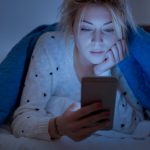
Having suffered with insomnia periodically throughout my whole life I know how frustrating it would be for you when you don’t get a good night’s sleep. Your head isn’t clear, your energy is low, you have little patience, you have mood swings, and your ability to handle stress and solve problems is impaired. During my journey to improve my health, I have discovered many strategies which have improved my sleep patterns. I have written numerous articles on the importance of sleep and tips on how to sleep better. In this article, I will focus on why using your phone or other device at night is disrupting your sleep.
Although I know what’s it’s like to struggle with insomnia, I have also experienced long periods of time where I sleep great. During these times, my world is so much better. I’m clear headed, I have lots of energy, my mental cognition seems to go up ten-fold, my ability to communicate my thoughts and ideas is quick and clear, my ability to handle stress and make decisions is way better, and my moods are more positive and happy. And my sport’s performance is way better!
All the strategies I have written about have worked to help my sleep patterns. My sleep is way better than it used to be. However, I still have periods where I can’t sleep well and have had to keep trying a variety of strategies. This brings me to the focus of this article.
Do you use your phone, tablet, or computer at night?
If you use your phone, tablet, or computer in the evening you’re more likely to have a poor sleep. Blue light emitted from these devices has been shown to decrease melatonin although better research is needed on this subject matter. (1, 2, 3, 4, 5, 6) Melatonin is your sleep hormone. If you’re not making enough melatonin, you can’t sleep well.
These devices can also stimulate us and create anxiety if they are near us. We have a tendency to use them to search for information, entertain us, and “grab” the next text or email. This “stimulation” and anxiety will create enough of a stress response within us where we can’t sleep.
There are two recommendations when using devices or computers in the evening:
- Either you don’t use them at all about three hours before going to bed, or
- You block out the blue light in the evening by setting your screen to warm or orange light (“Night Shift Mode” or “f.lux”) and/or wearing goggles or glasses that may help block out the blue light (amber lenses).
For years, I have used my phone to read as well as watch video clips on YouTube in the evening to “unwind”. To help block out the blue light, I have worn amber tint safety glasses. I feel these glasses have helped cut down on the eye strain due to the brightness of the screens. However, since I still had some issues sleeping, I started to question whether these glasses were working to block out the blue light. So I reached a point where I committed and stopped using my iPhone at night all together. I also put my phone in a different room as opposed to keeping it on my bedside table.
The results from my small experiment have been positive. Within the first week I was all ready getting deeper sleep and better REM sleep (dream sleep). And to this day staying away from my phone at night has helped me sleep better.
Do blue light blocking glasses or orange screen settings really block out blue light?
Some studies show that you can wear orange amber tint glasses or blue light blocking glasses in the evening while using these devices to block blue light. (7, 8, 9) However, a few studies have shown these glasses either don’t work or partially work to block out blue light. (10, 11)
To try and offset blue light, Apple and other tech companies have made software to make your screen a warmer colour of orange. Setting your screen to “Night Shift Mode” on your iPhone or iPad or installing “flux” can shift your screen to a warmer colour spectrum in the evening. In theory, this is supposed cut down on the blue light so you can sleep better. However, cutting down the blue light doesn’t always mean you’re going to sleep better.
A study published in 2019, found that melatonin was still significantly decreased using different “Night Shift” settings. (12, 13) So these warmer screen settings can help suppress melatonin levels less than if you weren’t using these settings, but it may not be enough to have a positive impact on your sleep. The study also concluded that it may be more of the “brightness” of the screens or that looking at these screens and using portable devices at night are “alerting” the brain and disrupting sleep.
Based on my personal experience and this latest research, I would advise you to avoid using any technology three hours before bed to see if that improves your sleep.
Based on my personal experience and the latest research, I would advise you to avoid using any technology three hours before bed to see if that improves your sleep.
Summary
Life is much more fulfilling when you can sleep well. If you are struggling with sleep, stop using your portable devices and computer at night three hours before bed to see if that helps you sleep better.
Now I would like to hear from you. Have you found you sleep better when you don’t use your portable devices or your computer in the evening?


Leave a Reply